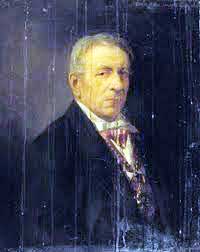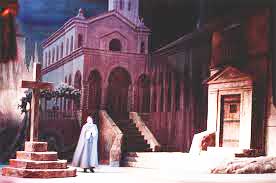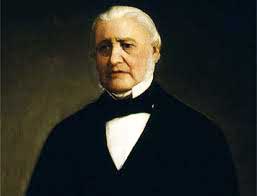Life & works of Duque de Rivas
Ángel Saavedra y Ramírez de Baquedano, a.k.a. Duke of Rivas was a Spanish writer, play writer, poet, painter and politician. His better known work is "Don Álvaro o la fuerza del sino" (1835). He was also president of the Spanish government for two days in 1854.
Ángel de Saavedra, Duke of Rivas - Life and Works

Ángel Saavedra, known as Duke of Rivas in the literary circles, was born in Córdoba, Andalusia, in 1791. His family came from an old aristocratic lineage and Ángel de Saavedra started to receive honors from a very young age. His education was from the beginning of the highest quality, as he was taught by French monks hiding in Spain from the French Revolution.
The yellow fever epidemic in Andalusia in the 1800's forced the family to move to Madrid. Two years after the move, Ángel's father died and his brother inherited the title of Duke of Rivas, while his younger brother was accepted in the Noble Seminar where he stayed for 4 years. In 1806 he became a member of the Guardia de Corps, of which his brother was Captain.
In 1808 both brothers joined the forces of the general Gregorio de la Cuesta, and they fought near Salamanca and in several other locations until 1809, when Saavedra is wounded in a fight against the French and he's thought dead. He recovers in a hospital in Baza, where he writes his famous romance "Con once heridas mortales". He's moved to the family house in Córdoba but the French invasion forces him to move to Malaga and then to Gibraltar and Cadiz. There he wrote his "Poesías" (Poems) in 1814, and several other plays like "Ataulfo" or " Doña Blanca". His aptitude for literature and painting and his frail health will earn him in the next few years some reputable jobs and titles.

At the return of Ferdinand VII Saavedra was ascended to Colonel of Light Cavalry of the staff of Plaza de Seville, and in this city he started a literary gathering. Riego's pronouncement in 1820 was the beginning of the liberal government where Saavedra played a big political role. In this year, the second editions of his Poems was released, and he was also granted a government permit to travel abroad, so he left for Paris on official business. His stay there was short. His close friend Antonio Alcalá Galiano pushed him to become a Member of Parliament through Córdoba. Saavedra was elected in December of 1821, and from there onwards he had a very active political career that lasted until the French arrived in Spain. It was also during this time that his play "La tragedia de Lanuza" was put on stage, and it was greatly praised by the critics.
The return of the king meant that Saavedra and his friend Galiano had to leave to Gibraltar in an exile that lasted 11 years. From Gibraltar, the writer moved to London, and during his journey there he wrote "El Español Constitucional en Londres". After spending some time in the British capital, he moved back to Gibraltar to marry María de la Encarnación de Cueto with whom he left in July of 1825 to the Papal States, where they weren't accepted, and so they looked for refuge in Malta.
Saavedra and his wife lived in Malta for 5 years and afterwards they moved to France, which was under the reign of Charles X an whose government forced Saavedra and his wife to live on Orleans. After the July Revolution and the beginning of the liberal government in France under the reign of Louis Philippe, the writer was able to move back to Paris where he lived next to his friend Galiano. Because of the economic problems that both of them had they decided to move to Tours with their families, where Saavedra finished writing "El moro expósito", some historic romances and a few poems.

The death of Ferdinand VII meant Saavedra could move back to Spain, which he did. His brother died a few months after his arrival, and the title of Duke of Rivas fell on to Saavedra. The next few years his life turned completely around from the one he had as an exiled writer, but after the fall of the government of Istúriz, in which Saavedra played a key role, he was forced to leave again. He stayed in Gibraltar until the Constitution of 37 was approved, and then he moved to Cadiz and then Seville. For a few years his life consisted of looking after his family and writing.
After the fall of Espartero he was named major of Madrid. He returned to politics and after visiting Naples in business he decided to stay there for 6 years. This was one of his most prolific periods as a writer. In 1850 he returned to Madrid as dedicated his life to his writing. He organized literary gatherings in his house with some of the most eminent literates in the capital. Saavedra, Duke of Rivas, died in Madrid in 1865.

